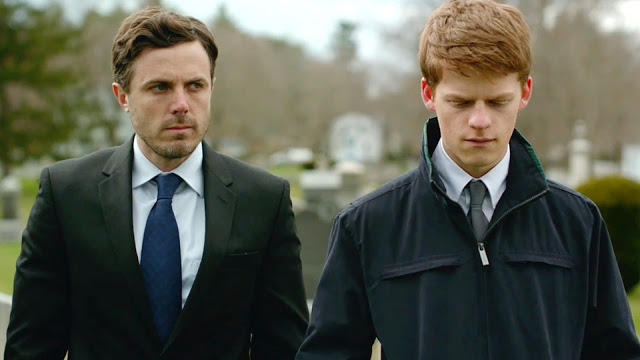Manchester by the Sea opens with a scene of tranquil, quintessentially New England bliss. As a trawler glides through Massachusetts Bay, an uncle gently teases his six-year-old nephew, lightly dropping his “R’s” while warning that child-chewing sharks prowl these waters. It’s a vision of serene, understated happiness in a film that subsequently grows heavy with melancholy and loss. You might think that the sweetness of this introduction is but a feint, a setup that lulls viewers into dropping their guard so that they can be more easily knocked out. Yet while Manchester by the Sea is primarily a tragedy—few movies are so profoundly, terribly sad—it is not exactly a downer. Instead, it somehow manages to be life-affirming as well as shattering, to reveal glimpses of light and hope within its miasma of heartbreak and devastation. It derives its enormous power not just from its literal tragedy, but from its emotional honesty.
Written and directed by Kenneth Lonergan, Manchester by the Sea stars Casey Affleck as Lee Chandler, a handyman who lives alone in a wintry Boston suburb. In its prosaic early scenes, the film efficiently establishes Lee as competent, sullen, and a bit of an asshole. He snaps at clients, brawls at bars, and seems generally incapable of human connection. His solitary routine of changing lightbulbs and shoveling snow is interrupted when he receives word that his brother, Joe (Kyle Chandler), who lives in the titular hamlet an hour-and-a-half north of Boston, has just died of a heart attack. That’s dreadful news—in a brief moment at the hospital, Affleck silently conveys the bond that Lee shared with his sibling, and the depths of his pain—but it isn’t exactly surprising, given that Joe had been suffering from congestive heart failure for the past decade. The real shock comes when Lee meets with a lawyer to read Joe’s will and discovers that he is now the guardian to Patrick (Lucas Hedges, very good), Joe’s 16-year-old son.
Lee’s immediate and visceral reaction to this pronouncement—”I can’t be the guardian!”—is arguably a statement of fact as well as an expression of disbelief. With his meager job and his short temper, he seems ill-equipped to parent anyone, much less an erratic teenager whose father just died. (Lee bristles at the suggestion of involving Patrick’s mother, an estranged alcoholic who is persona non grata in the Chandlers’ world.) But Joe’s will is black-and-white, and Lee is faced with a choice: Either he radically changes his life, or he abdicates his responsibility to Patrick and, in the process, betrays the wishes of his deceased brother.
From here, Manchester by the Sea unspools as a variation on the classical father-son bonding picture, if one refracted through Lonergan’s distinctly mournful sensibility. Flung together by circumstance, Lee and Patrick must learn to navigate one another’s boundaries, an especially tentative process given that they appear to barely know each other. (When Patrick asks if his girlfriend, played by Moonrise Kingdom‘s Kara Hayward, can sleep over, a bewildered Lee stares blankly at his nephew, then finally responds, “Am I supposed to tell you to use a condom?”) Beyond that, they must deal with the wearying banalities that attend Joe’s demise: making funeral arrangements, notifying relatives, selling Joe’s property, and doing everything else that follows the loss of a loved one. (In a detail that’s indicative of the film’s verisimilitude, the New England ground is too stiff for Joe to be buried until the spring, meaning his corpse must temporarily reside in a freezer, a development that deeply disturbs Patrick.) In a sense, the movie is a spiritual cousin to Amour, Michael Haneke’s unflinching look at the drudging labor that accompanies elderly desiccation.
But Lonergan is interested in more than just chronicling the mundanity of life after death. He wants to fully examine Lee’s and Patrick’s lives, a desire that pushes Manchester by the Sea in some unexpected directions. For example, several scenes could fit snugly within a mild teen sex comedy, as Patrick and his (other) girlfriend (Anna Baryshnikov) fumble with the sticky awkwardness of adolescent exploration, only for her concerned mother to knock on the bedroom door at inopportune times. That’s often funny, and indeed, much of Lonergan’s writing exhibits an acrid, black humor, usually involving Lee and Patrick’s antagonistic banter. Yet there are also moments of quietly observed domestic tension, as when Patrick attempts to reconcile with his now-born-again mother (a terrific Gretchen Mol), resulting in a meal that is cringingly strained.
This wide-ranging approach is nothing new to Lonergan, whose prior feature, the magnificently messy Margaret, was made in 2005—it spent years in editing purgatory, finally dropped to middling reviews in 2011, and has since acquired cult status. Margaret was furiously compelling cinema with moments of utter brilliance, but it also felt haphazard; Manchester by the Sea is similarly expansive, but it never feels scattered. Whether it’s following Lee and Patrick’s squabbles about whether to sell or salvage Joe’s boat or dropping in on Patrick’s band practice, the movie remains a cohesive portrait of two people struggling to comprehend their own loss and learning how to move on.
Some learn more quickly than others. Lee, by all appearances, is a broken man, but as that opening scene suggests, he wasn’t always this way, and we gradually discover how old traumas have chiseled away at his humanity. Lonergan piques our curiosity early—”That’s Lee Chandler, the Lee Chandler?” someone asks in amazement—but he takes his time, first allowing us to familiarize ourselves with Lee, then eventually providing greater context to reshape our understanding of him. The editing, which uses frequent flashbacks to Lee’s earlier days with Joe, is jagged but not disorienting, and it adds verve to a film that is otherwise delicate and placid.
That isn’t a criticism. Lonergan’s filmmaking exhibits a stillness that harmonizes with his patience as a storyteller—he likes to hold static shots and focus on his actors’ faces, even if he concludes scenes a beat sooner or later than you might anticipate. His one directorial flourish (crucial to Margaret) is his use of music; here, he peppers Manchester by the Sea with choral compositions by Lesley Barber, as well as selections from Handel’s Messiah, a gentle touch that accentuates the movie’s pastoral warmth. But it is an extended sequence set to Albinoni’s “Adagio” that is the film’s monstrous apex, an operatic blast of stunning power in which the missing pieces fall horribly into place, and the full weight of Lee’s tragic past comes crashing down.
It’s brutal. But while Manchester by the Sea pulls no punches in surveying its symbolic wreckage, there is nevertheless something marvelous about watching Casey Affleck’s performance. By turns taciturn and explosive, Lee is a lost soul, but in essaying his volatility, Affleck (in a part originally intended for Matt Damon) is ruthlessly unsentimental. He portrays Lee as a hollowed-out shell, an empty vessel who finds it too painful to even form basic emotions, much less articulate them. “You can’t just die,” his ex-wife, Randi (Michelle Williams, heartrending in a handful of scenes), implores him. Affleck’s work renders her plea moot—Lee’s been dead for years.
As I said, brutal. Lonergan and Affleck have no use for half-measures—they do not spare you from Lee’s agony. But Manchester by the Sea is no mere tearjerker. It has too much empathy, too much sincerity, to blindly ravage its audience. Instead, in considering the shriveled hopes of one man and the plaintive longing of another, it does something far more powerful: It locates the beauty within the grief.
Jeremy Beck is the editor-in-chief of MovieManifesto. He watches more movies and television than he probably should.




